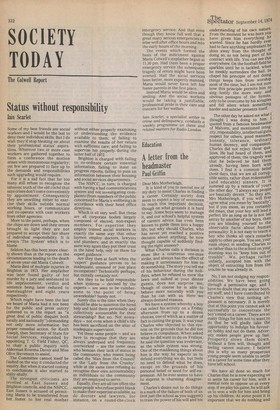SOCIETY TODAY
The Colwell Report
Status without responsibility
lain Scarlet
Some of my best friends are social workers and I would be the last to deny their individual skills. But I do wish they'd stop bleating on about their 'professional status' aspirations. Wherever two or more case workers are gathered together to form a conference the motion arises with monotonous regularity; yet few are prepared to face up to the demands and responsibilities such upgrading would require.
For it is a sad fact that far too Many still refuse to recognise the inherent truth of the old cliche that says crises don't come conveniently by appointment. Consequently they are unwilling either to exercise their skills outside normal working hours, or communicate and co-operate with case workers from other agencies.
More to the point, perhaps, when the chips are down and their errors brought to light they are not prepared to accept their fair share of individual responsibility. It is always 'The System' which is to blame.
Seldom has this been more clearly shown than in the report on the circumstances leading to the death of seven-year-old Maria Colwell.
Maria died of multiple injuries in Brighton in 1973. Her stepfather was later found guilty of her murder by a jury and sentenced to life imprisonment, verdict and sentence being later reduced to manslaughter and eight years respectively.
Which might have been the last we heard of Maria had it not been for the public and press outcry (referred to in the report as "a great deal of public disquiet both locally and nationally") demanding not only more information but proper remedial action. Sir Keith Joseph, then Secretary of State for Social Services, responded by appointing T. G. Field Fisher, QC, to chair a public inquiry with Alderman Rowena Davey and Miss Olive Stevenson to assist.
The Committee cannot itself be faulted on the way it conducted the inquiry. But when it started coming to conclusions it also started to shilly-shally.
The strongest criticisms are levelled at East Sussex and Brighton councils, and the NSPCC. East Sussex is accused of permitting Maria to be transferred from her foster to her real mother without either properly examining or understanding the evidence available to them; of failing to examine the results of her return with sufficient care; and failing to supervise her properly, during the tatter half of 1972.
Brighton is charged with failing to co-ordinate certain essential information, failing to insist on progress reports, failing to pass on information between their housing and social services departments. The NSPCC, in turn, is charged with having a bad communications system and not investigating complaints (from members of the public concerned for Maria's wellbeing) in accordance with their head office directives.
Which is all very well. But these are all corporate bodies largely composed of elected, non-expert members. For expertise they employ trained social workers in exactly the same way that other laymen employ doctors, lawyers and plumbers; and in exactly the same way again they put their trust in the hired help, rely on them for expert guidance.
Are they then at fault when the 'expert' guidance proves to be inadequate, unsound or just plain incompetent? Technically perhaps, but morally certainly not. Are they to be held responsible when systems — devised by the experts — are seen to be cumbersome to the point of being unworkable? Surely not. Surely this is the time when they should be able to summon the hired help and hold them personally and collectively accountable for their stewardship? But no. Not nowadays — not even when a child's life has been sacrificed on the altar of inadequate supervision.
Yet these same people — and we have to recognise that they are always underpaid and frequently overworked — are the same ones who bemoan their lack of status in the community, who resent being called the 'Man from the Council' or the 'Lady from the Cruelty', while at the same time refusing to recognise their own accountability as individuals to the community they are employed to serve. Equally, they are all too often the same people who refuse point blank to make their expertise available, as do doctors and lawyers, for instance, on a round-the-clock emergency service. And that even though they know full well that a great many serious emergencies do arise well after office hours and into the early hours of the morning. The events which formed the basis of the indictment against Maria Colwell's stepfather began at 11.30 pm. Had there been a proper emergency service the subsequent tragedy of errors might have been averted. Had the social services been better, more expertly manned, Maria would never have left her foster parents in the first place.
Instead Maria would be alive and smiling. And the social workers would be taking a justifiable, professional pride in their care and concern for her welfare.
lain Scarlet, a specialist writer in crime and delinquency, conducts a weekly programme on these and related matters for Radio London


































































 Previous page
Previous page